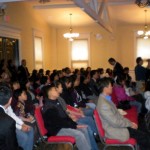August 25, 2009
Agents of Change?
By Brian Maher
Often, we as followers of Jesus we are encouraged to become agents of change or agents of transformation. Both terms are couched in the context of God’s Kingdom agenda which integrates word, deed, life and sign. All around the world there are pockets of faith collectives who have centered their lives on following Jesus and who are bringing integrated change to people and communities. What is it about these people that enable them to bring change?
Change is perpetual and gives rise to bo th problems and opportunities. Every solution we apply to a problem perpetuates further change and again creates different problems and again, more opportunities. By solving problems, we create new realities. As Heraclitus wrote, “Nothing endures but change.” Management Guru Dr. Ichak Adizes would say; “Since change is here to stay, problems are here to stay….Forever!” I agree with Dr. Adizes belief that change is life, and as long as we are alive we will have problems. And the corollary here is that dead things are not plagued by change so the livelier one is the more problems they are likely to have.
th problems and opportunities. Every solution we apply to a problem perpetuates further change and again creates different problems and again, more opportunities. By solving problems, we create new realities. As Heraclitus wrote, “Nothing endures but change.” Management Guru Dr. Ichak Adizes would say; “Since change is here to stay, problems are here to stay….Forever!” I agree with Dr. Adizes belief that change is life, and as long as we are alive we will have problems. And the corollary here is that dead things are not plagued by change so the livelier one is the more problems they are likely to have.
Philip Jenkins in his book The Next Christendom, The Coming of Global Christianity, traces the decline of Christianity in the Northern Hemisphere and notes the rapid growth of the church in the Southern Hemisphere. Commissioned by Jesus as agents of transformation, how can we as a faith collective be in decline or slow death? Those who are surviving and who are alive are those who have learned to manage change well. Those who manage accelerated and complex change well in this age are the ones who make the right decisions and implement them the fastest.
The problem for collectives of Jesus followers is not change, but the acceleration of change. And with change comes problems at faster and faster rates. This and the fact that Christian leaders over the age of 45 tend to plateau and cease to interpret and analyze cultural trends and the effects they have on both society and faith collectives. Many of us Jesus followers dread change because it brings problems and problems bring stress and today we feel overwhelmed and inundated because of the accelerated rate of change. We experience and try to deal with this accelerated change in all parts of our personal lives and when it comes to church, we feel too drained to continue to manage and deal with change so church often becomes a haven of past traditions where we can lay down our weary souls.
We need to implement change at the same rate it comes down the pike to us. We cannot slow change. Right now we need to understand that the lion’s share of our expression of church is a cultural construct and much of what we do in Jesus’ name is done in the name of tradition that stems from cultural influence from the good ole’ days gone by, rather than the Bible. The very modernism J.Greshem Machen fought so hard to protect the church against at the turn of the century is the very thing that ended up molding America and the church in ways Machen could not have fathomed. How much is our expression of church is modern and how much of it is Biblical. I think we would all be quite surprised to find out the truth, and how just how much we are prisoners of culture.
Jesus understood the culture he ministered in, and if we are to be as relevant as Jesus was in his culture than we need to first realize that our culture is now going through a large paradigm shift and those who were born after 1964 have very different culture values and perspectives than the boomers (who are institutional church friendly) and those from the World War II era. The message doesn’t change but the medium needs to.
The challenge the leadership of our faith collectives faces today is not only to manage change, but to lead accelerated change in the face of accelerated change, and stay together while doing it. Leaders need to prepare Jesus followers to learn how to undergo change and re-integrate it into the system on a consistent basis. A missional compass will be of great help in making the right decisions and implementing them in beat with rapid changes that confront us each moment of each day. Leaders need to return to their jobs of cultural interpretation and lead us out of cultural prisons of disobedience to become the cultural pilgrims and sojourners Christ calls us to be. It is then that change won’t be chains.
“Reasonable men adapt to their environments, unreasonable men try to adapt their environments to themselves.” George Bernard Shaw
Jenkins, Philip, The Next Christendom, The Coming of Global Christianity. Oxford University Press, New York. 2002.
Adizes, Ichak. Managing Corporate Lifecycles: how to get and stay at the top. Prentice Hall Press, Paramus, NJ. 1999
Written by: Cambodianchristian.Com
Trackback URL: http://www.cambodianchristian.com/article/wp-trackback.php?p=53






